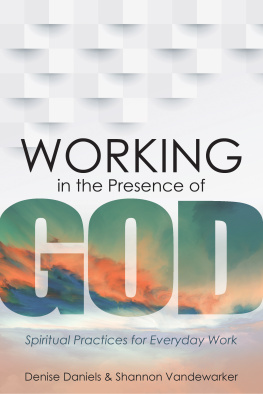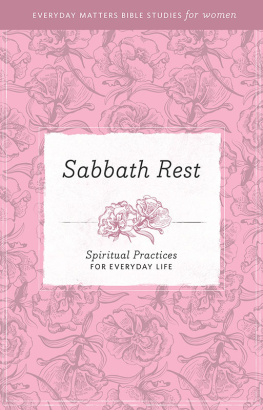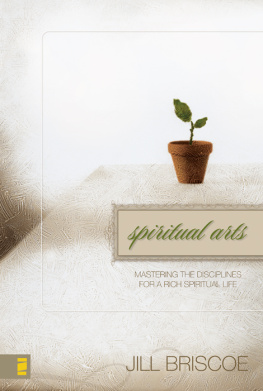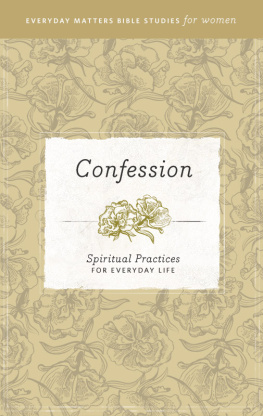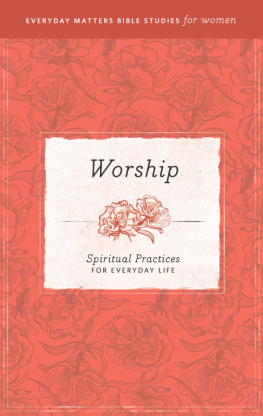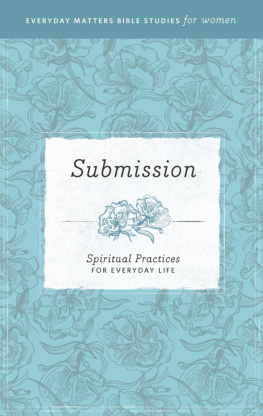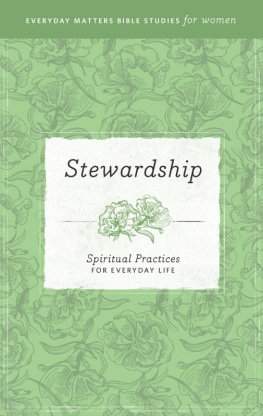Working in the Presence of God: Spiritual Practices for Work(ebook edition)
2019 Denise Daniels and Shannon Vandewarker
Hendrickson Publishers Marketing, LLC
P. O. Box 3473
Peabody, Massachusetts 01961-3473
www.hendrickson.com
ebook ISBN 978-1-68307-291-1
All rights reserved. No part of this book may be reproduced or transmitted in any form or by any means, electronic or mechanical, including photocopying, recording, or by any information storage and retrieval system, without permission in writing from the publisher.
Unless otherwise noted, Scripture quotations contained herein are taken from the Holy Bible, New International Version, NIV. Copyright 1973, 1978, 1984, 2011 by Biblica, Inc. Used by permission of Zondervan. All rights reserved worldwide. www.zondervan.com The NIV and New International Version are trademarks registered in the United States Patent and Trademark Office by Biblica, Inc.
Scripture quotations marked MSG are taken from THE MESSAGE, copyright 1993, 2002, 2018 by Eugene H. Peterson. Used by permission of NavPress. All rights reserved. Represented by Tyndale House Publishers, Inc.
Scripture quotations marked (NLT) are taken from the Holy Bible, New Living Translation, copyright 1996, 2004, 2015 by Tyndale House Foundation. Used by permission of Tyndale House Publishers, Inc., Carol Stream, Illinois 60188. All rights reserved.
Due to technical issues, this eBook may not contain all of the images or diagrams in the original print edition of the work. In addition, adapting the print edition to the eBook format may require some other layout and feature changes to be made.
First eBook edition September 2019
PREFACE
A Theological Framework for Work
In Genesis 1 and 2, one of the first things we learn is that God is a worker. In the beginning, God is a light bringer, an ocean spreader, a land former, and a star inventor. The creation is not finished in an instant, but God works to make these things come to be. After the heavens and the earth are created, Gods final act of creative work is to make human beings out of dust and fill them with the breath from his very own lungs.
Next, God gives Adam and Eve work to do. Its important to note that the mandate for work comes before things go sideways in Edenbefore their fall and subsequent banishment (Gen. 2:15). Made in the image and likeness of Godthe imago DeiAdam and Eve have work to do that connects with Gods purposes for the world. Genesis 2 suggests that God himself takes care of the plants before there is someone to work the ground (Gen. 2:45). When Adam is created, Eden gains a human gardener. Although God could have created a fully developed world, he waited in order to provide someone else the joy of being a caretaker, a co-creator, a worker.
God provided work to do and then commanded Adam and Eve to fill the earth and to subdue it, meaning that they were to make something of the world. As Timothy Keller and Katherine Leary Alsdorf suggest, The word subdue indicates that, though all God had made was good, it was still to a great degree undeveloped. God left creation with deep untapped potential for cultivation that people were to unlock in their labor. God had created the earth, but it was not finished. He got everything started and then told humans he was going to use them to be co-creators in filling the earth, working to make it grow and flourish.
CO-CREATORS WITH GOD
Like an empty lot in need of building plans, construction, and landscaping, God gave Adam and Eve the garden and the created order to develop. They were told to work the land and cultivate the dirt so that it would bear fruit. They too were to bear the fruit of making a family and creating the first human culture.
As we look at the beginning of creation, we see our original purpose. As Adam and Eve were called to subdue the earth, we are also humans created in Gods image, called to work as co-creators with the Lord of creation. We are to make something with the materials we are given. But more importantly, God asks us to make something of the world in such a way that it reflects the imago Deihis image.
When we work, we not only reflect the image of the original Creator, but we also accomplish this work through the power and movement of God expressed through us. Just as Adam and Eve could not have accomplished their work without the Lords aid, we too find our best fulfillment through work done that aligns with Gods purposes and that recognizes Gods empowerment. As humans with agency, we do not throw up our hands and leave all the work to our heavenly Father, nor do we put all the pressure on ourselves to conjure up meaning, success, and progress in our work. We are called to be co-creators. In that co-creation, we follow the call of God to cultivate and subdue by showing up, taking responsibility for our work, and doing it to the best of our abilities. We do all this in the knowledge that we can do nothing without the enabling power of God working through us, as we experience the privilege of continuing the good work he began at creation.
THE WONDER OF WORK
Work Is Good
Revisiting the creation story reveals Gods attitude as he worked. It was not in drudgery that God swirled planets into existence and flung them onto their orbital paths. The Lord did not begrudgingly put together atoms and chemicals to make water flow into the oceans. No, the Creator of the universe delighted in his work, calling creation tove mode (Gen. 1:31 in the Hebrew), which can be translated as overflowingly abundant and ever increasing in good. God called creation abundantly good, because he worked to create it and it brought him great delight.
The pinnacle of Gods creation was humanity, and the Lord was pleased with the work he performed in bringing humanity to life. Gods work is indeed delightful! As his image-bearers, we have been created also to delight in the work God has given us to do. Yes, to be sure, some things are frustrating and heartbreaking about our work. But this is not a result of Gods original intent and design for the work he gave us. We are not given work to do begrudgingly, but to find delight in it. Joy can be found in our work, because we have the privilege of being in relationship with the Creator of the universe who gives us the responsibility to co-create alongside the Trinity, making something of our little corners of the world.
THE HEARTBREAK OF WORK
Work Is Good, But Its Broken
As anyone who has engaged in any sort of work knows, it is not always delightful. While the original intent of work was to create and produce with joy, if we are honest, there are parts of our labor that break our hearts, that frustrate us to no end, and that we do not understand. Relationships in our workplaces can be flawed or even destructive. The reality of our work is that there is often toil involved in it. It is sometimes hard and can bring deep disappointment and sorrow, and our efforts do not always result in the outcomes we intended or desired. The residue of the forbidden fruit is smeared all over our workplacesand not surprisingly, many experience institutional brokenness on daily basis.
This, of course, can be frustrating and deeply discouraging. In our exasperation, we groan with all of creation that things sometimes do not work as they should, problems are not solved as quickly as we would like, and we do not accomplish what we had hoped. So, the ache of creation we feel in our work reminds us that we labor in a fallen worlda world that does not function as it was intended. Keller and Alsdorf describe our condition well, While God blessed work to be a glorious use of our gifts and his resources to prosper the world, it is also cursed because of mankinds fall. Work exists now in a world sustained by God but disordered by sin.

